Global Campus
Caucasus
The Master’s Programme in Human Rights and Democratization in the Caucasus (CES)

Date & Place
September 2024, Yerevan
Duration
12 months
Requirements
Bachelor’s degree (at least 180-240 ECTS)
Coordinator
Centre for European Studies, Yerevan State University
An intensive, rigorous programme specialising in the Caucasus, awarded by Yerevan State University.
Overview
The Master’s Programme in Human Rights and Democratisation in the Caucasus (CES - GC Caucasus)
is an intensive, interdisciplinary program with a focus on the post-Soviet space. It offers a robust theoretical foundation and three specialised tracks—legal, political, and interdisciplinary—allowing students to tailor their studies to their interests.
The programme emphasises both research and practical skills development, including hands-on experiences such as fact-finding mission interviews and policy paper writing, preparing graduates for impactful careers in human rights and democratisation.
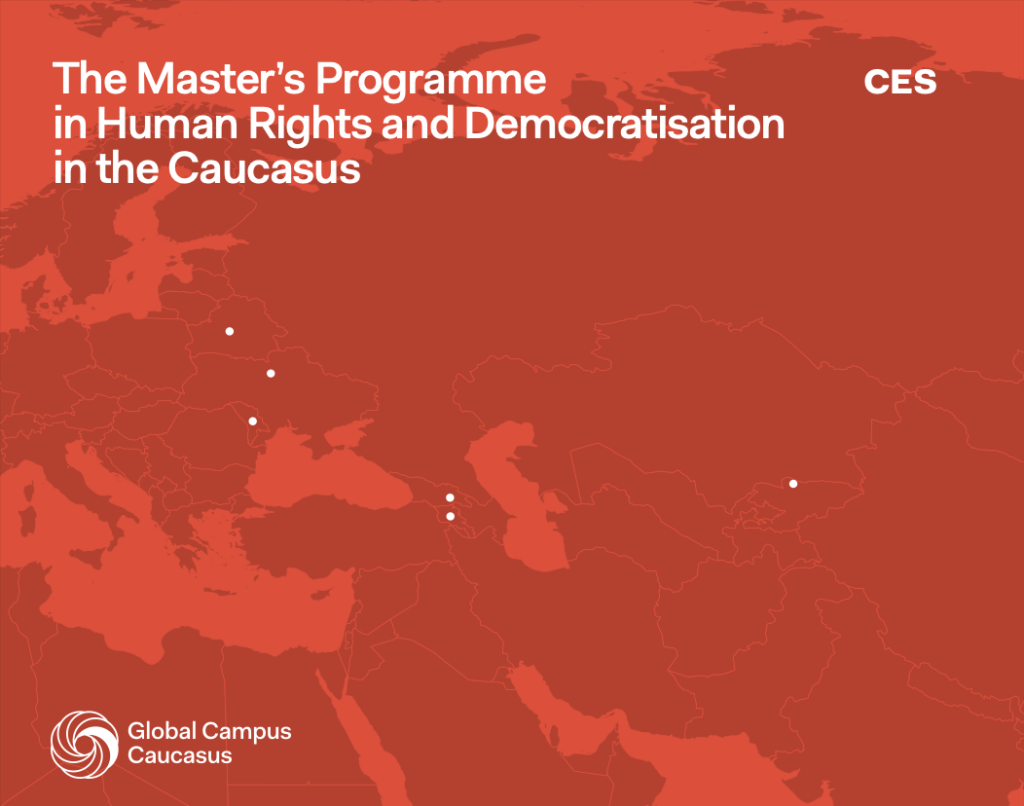
People
Artur Ghazinyan / Vladimir Martirosyan / Kristine Gevorgyan / Lilit Mirzoyan / Arusyak Aleksanyan / Lilit Karapetyan / Mariam Muradyan
Regional Network
- Yerevan State University, Armenia — coordinator
- Ivane Javakhishvili Tbilisi State University, Georgia
- American University in Central Asia, Kyrgyzstan
- Moldova State University, Moldova
- Taras Shevchenko National University of Kiyv, Ukraine
With the participation of academics from:
- Belarusian State University,
Belarus
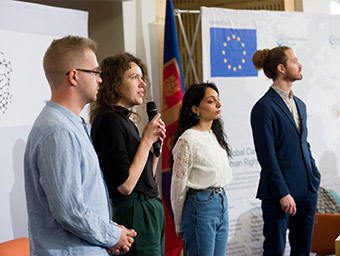
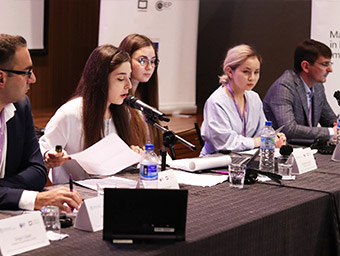
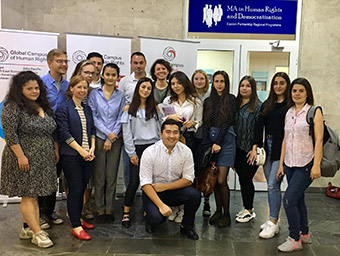
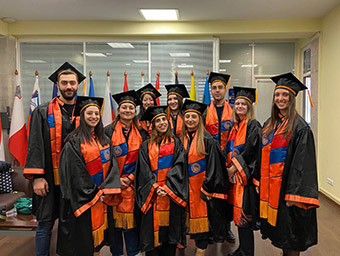
Programme Details
– 1st Semester (Term 1): September to January | Yerevan State University
Students take seven courses taught by professors and researchers of YSU
- Theoretical Bases of Human Rights
- Democracy: Theory and Practice
- Human Rights in legal perspectives
- Litigation before the European Court of Human Rights
- Public Policy Praxis & Methodology
- Public Advocacy & Fact-finding
- Research Methods & Academic Writing
During the semester, side events, visits and guest lectures are organised to complement the curriculum.
– 2nd Semester (Term 2): February to May or March to June | Member Universities across the region
Students are placed at one of the universities within the GC Caucasus network, where they engage in both mandatory and elective courses. Each of the four member universities offers specialisations that enrich the programme’s political, legal, and interdisciplinary tracks, providing a diverse academic experience.
– 2nd Semester (Term 3): June to October | Internship organisation & location of choice
The third term is focussed on writing and defending the thesis, as well as completing a short internship. Students can intern for a minimum period of 4-6 weeks with NGOs, state bodies, research institutions, public and private organisations, media companies, etc. Students are free to intern and write their thesis in a location of their choice.
- Yerevan State University (Armenia)
- Ivane Javakhishvili Tbilisi State University (Georgia)
- American University in Central Asia (Kyrgyzstan)
- Moldova State University (Moldova)
- Taras Shevchenko National University of Kiyv (Ukraine)
- Bachelor’s degree (at least 180-240 ECTS) or an equivalent qualification from a recognised higher education institution.
- Excellent communication skills in English (Russian is an asset)
- Professional and/or research interest in human rights and democratisation
The Programme is open to citizens from the Eastern Partnerships region, Central Asia and Russia. Limited places might be available to applicants from outside of the region
Maximum number of accepted students: 30
- Nationals of the Republic of Armenia, Artsakh, Javakhk and Diaspora Armenians from Syria: 900,000 AMD (approx 2120 euro)
- Nationals of Azerbaijan, Belarus, Georgia, Kazakhstan, Kyrgyzstan, Moldova, Russia, Tajikistan, Turkmenistan, Ukraine and Uzbekistan: 1,170,000 AMD (approx 2755 euro)
- Other nationals (including Ukrainians and Moldovans): 1,350,000 AMD (approx 3180 euro)
Up to 20 full and partial scholarships are offered to cover tuition fees, travel expenses and/or monthly stipend for 8 months.
CES alumni hold different positions in governmental and non-governmental organisations in Caucasus, Europe and in their home countries. Several alumni are enrolled in or have completed PhD programmes. The Centre for European Studies involves graduates in teaching activities, as well as includes them in research projects. Learn more about the CES alumni.
Are you passionate about promoting human rights, democracy, rule of law and good governance in the Caucasus? Want to learn more?
CES: A focused combination of academic rigour, practical skills, and regional expertise in the post-Soviet context.
info@ces.am
CES Website